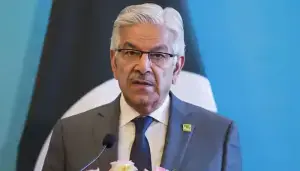Ruling alliance opts for early closure of markets to save ‘foreign exchange’
4 min readThe National Economic Council (NEC) approved the energy conservation package on Tuesday to “save” foreign exchange, the planning minister said on Tuesday.
“Our economy will remain vulnerable if we keep depending on fossil fuels. Energy has become a significant challenge for Pakistan due to price volatility in the global markets,” Ahsan Iqbal said at a press conference in Islamabad.
Provincial governments were urged Tuesday to implement an energy conservation program under which shops and commercial centers would close by 8pm, according to the Prime Minister’s Office (PMO).
The statement was issued after a National Economic Council (NEC) meeting. Participants at the NEC meeting were informed that implementing the plan would result in over 10 to 15% or Rs1 billion reduction in fuel import bills in a short period of time, according to the PMO statement.
“The provincial governments were asked to play their role in the implementation of different aspects of the National Energy Conservation Plan and contribute to fulfilling this national duty,” said the statement.
“We hope that provincial governments will implement the energy conservation package,” Iqbal told reporters. “And, we will play our role in energy conservation in order to save the precious foreign exchange.”
The government inherited an economic crisis from the previous government. The Ministry of Planning and Development held the “Turnaround Pakistan Conference” in June 2022 to address the economic issues, he said.
Around 1,000 leaders from corporate, development, and academia attended the conference. These leaders from across the country presented their suggestions, which culminated in the document “5Es Framework”, which included the promotion of exports, E-Pakistan, environment, and energy, he added.
Pakistan approved an estimated 3.5 per cent GDP growth target for 2023-24 financial year budget, Iqbal said.
The government is set to present the annual budget on Friday, at a time when the country faces its worst economic crisis with months of delay in securing funding from the International Monetary Fund.
Iqbal said the growth target was realistic. “We are taking those choices which take the country toward stability,” he told a press conference in Islamabad after a meeting of the NEC chaired by the prime minister approved the estimated budget figures.
He did not disclose other budget targets except for the GDP and development spending which he said will be Rs1.15 trillion.
Iqbal made the announcement hours after a government source gave the figures to Reuters, including the 3.5 per cent GDP target, and a 21 per cent inflation projection for the fiscal year 2023-24.
Pakistan, which is also in political turmoil, has been caught up for months in an acute balance of payments crisis, with the State Bank of Pakistan’s foreign exchange reserves dipping to as low as to cover hardly a month of controlled imports.
Iqbal also pointed out the dismal condition of the economy, saying the government would not be able to pay off debt fully through federal revenue.
“This is a defining moment of where we have reached,” he said. “(The country) will need to borrow for the rest of budget that includes salaries for the government, defence budget, development budget, pension and subsidies.”
The estimated numbers were shared in the meeting ahead of the budget announcement, which could see changes in reviews in the lead-up to the presentation by Finance Minister Ishaq Dar in parliament, the source added.
The total outlay of the budget, or total spending, is expected to be Rs14.5 trillion, said the source.
He added that the proposals also included a fiscal deficit target of 7.7 per cent of GDP and a revenue collection target of Rs9.2 trillion.
The budget is being keenly watched as the government is caught between a painful fiscal adjustment reforms agenda set by the IMF, and to make room for any relief to the people ahead of a national election scheduled in early November.
For the outgoing fiscal year 2022-23, which ends on June 30, the country’s GDP growth fell to 0.29 per cent against last year’s annual budget target of 5 per cent, and a revised projection of 2 per cent by the central bank. Inflation posted at 38 per cent in May is the highest in Asia.
The IMF’s $1.1 billion funding, stalled since November, is critical for Pakistan to unlock other bilateral and multilateral financing to avert a debt default.
Prime Minister Shehbaz Sharif said that the NEC, in a marathon meeting, took decisions for sustainable growth and progress in Pakistan through human capital development and economic self reliance.
“These objectives would be achieved through enhanced productivity and efficiency, greater competitiveness, innovation, digital tools, and technologies of future,” he said.
(With input from Reuters)
For the latest news, follow us on Twitter @Aaj_Urdu. We are also on Facebook, Instagram and YouTube.

























Comments are closed on this story.